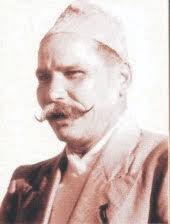Related Research Articles

The Kingdom of Nepal was a Hindu kingdom in South Asia, formed in 1768 by the expansion of the Gorkha Kingdom, which lasted until 2008 when the kingdom became the Federal Democratic Republic of Nepal. It was also known as the Gorkha Empire, or sometimes Asal Hindustan. Founded by King Prithvi Narayan Shah, a Gorkha monarch who claimed to be of Thakuri origin from chaubisi, it existed for 240 years until the abolition of the Nepalese monarchy in 2008. During this period, Nepal was formally under the rule of the Shah dynasty, which exercised varying degrees of power during the kingdom's existence.

The Nepali Congress is a social democratic political party in Nepal and become the largest party in the country. The party has 870,106 members as of the party's 14th general convention in December 2021, making it the largest party by membership in Nepal. In June 2023, the party started online membership since the emergence of youth leaders in vital posts to attract youths to the party. The party is led by former prime minister, Sher Bahadur Deuba since the party's thirteenth general convention in 2016. The party won 89 seats in the 2022 general election and is currently the largest parliamentary group in the House of Representatives.

The Communist Party of Nepal, abbreviated CPN, was a communist party in Nepal from 1949 to 1962. It was founded on 15 September 1949 to struggle against the autocratic Rana regime, feudalism, and imperialism. The founding general secretary was Pushpa Lal Shrestha. The founding members of the Communist Party of Nepal were Moti Devi Shrestha, Niranjan Govinda Vaidya, Nar Bahadur Karmacharya and Narayan Bilas Joshi.

The Communist Party of Nepal (Unified Marxist–Leninist) (Nepali: नेपाल कम्युनिष्ट पार्टी (एकीकृत मार्क्सवादी-लेनिनवादी), romanized: nēpāl kamyuniṣṭ pārṭī (ēkīkṛt mārksavādī-lēninavādī); abbr. CPN (UML)) is a communist political party in Nepal. The party emerged as one of the major parties in Nepal after the end of the Panchayat era.

Sher Bahadur Deuba is a Nepali politician and former prime minister of Nepal. He has also been serving as the president of the Nepali Congress since 2016. Deuba has served five terms as prime minister and is the Member of Parliament for the parliamentary constituency of Dadeldhura 1.

Chhetri, historically called Kshettriya or Kshetriya or Khas are a Nepali speaking warrior group of Khas community, some of whom trace their origin to migration from medieval India. Chhetri was a caste of administrators, governors,warriors and military elites in the medieval Khas Kingdom and Gorkha Kingdom. The nobility of the Gorkha Kingdom mainly originated from Chhetri families. They also had a strong presence in civil administration affairs. The bulk of prime ministers of Nepal before the democratization of Nepal belonged to this caste as a result of the old Gorkhali aristocracy. Gorkha-based aristocratic Chhetri families included the Pande dynasty, the Basnyat dynasty, the Kunwar family, and the Thapa dynasty,.

Gurung, also known as Tamu Kyi or Tamu Bhāṣā, is a Sino-Tibetan language spoken by the Gurung people of Nepal. The total number of all Gurung speakers in Nepal was 227,918 in 1991 and 325,622 in 2011.

Subarna Shamsher Rana was a leading figure in the movement to overthrow the ruling Rana oligarchy and to establish democracy in Nepal. He was one of the three leaders of the Nepali Congress in the late 1940s, opposing his relatives, the Rana family, who held power in Nepal at the time.

Nepal Students' Union is the largest student political wings in Nepal. The Nepal Student's Union represents the Nepali Congress. During the autocratic King's rule, the union played a major role in unifying students to overthrow King's direct rule and establish democracy in the country.

Ram Baran Yadav is a Nepali politician and physician who served as the first president of Nepal from 23 July 2008 to 29 October 2015, following the declaration of republic in 2008. Previously, he served as Minister of Health from 1999 to 2001 and general secretary of the Nepali Congress.

General elections were held in Nepal on 9 May 1981 to elect members of the Rastriya Panchayat. 80% of the seats were elected through adult universal suffrage; this was the first election through universal suffrage held in Nepal in 22 years. However, political parties were banned at the time, and the main underground opposition forces called for a boycott of the election.
Surya Prasad Upadhyaya was a Nepalese politician. Upadhyaya was a leader of the Nepal Democratic Congress, which merged with into the Nepali Congress in 1950.
Gurung is a common surname among people of the Gurung Tamu ethnic group in Bhutan, Nepal and India, as well as among other groups who are not ethnically Gurung. At the time of the 2011 Nepal census, 798,658 people identified as Gurung. Gurung people predominantly live around the Annapurna Region in Manang, Mustang, Dolpo, Kaski, Lamjung, Gorkha, Parbat and Syangja districts of Nepal. They are one of the main Gurkha tribes and have been established as one of the successful indigenous communities in Nepal. Most of the Gurung people serve in the military, farming, entertainment industry, business, and politics. The origin of the Gurung people can be traced back to Qiang people located in Qinghai, China.

Kunwar Indrajit Singh, popularly known as Dr. K.I. Singh or just K.I. Singh was a Nepali politician and revolutionary who served as the 20th Prime Minister of Nepal in 1957. He was a key member of the Nepali Congress for his role in organizing the 1951 Nepali Revolution, and was a leader in its militant wing, the Muktisena, and later refused to recognize the Delhi Accord and was forced to flee the country following a revolt he took part in. In 1955 he returned and formed the United Democratic Party, and following the installation of the Panchayat system he fought for its end, for which he was jailed. Following his release, he went into self-imposed exile, but eventually returned to Nepal and was elected a member to the Rastriya Panchayat. He became known as the "Robin Hood of the Himalayas", becoming an incredibly popular figure throughout the country.
Gajendra Narayan Singh was a Nepali politician and a Madhesi activist. He founded the Nepal Sadbhawana Party (NSP) in 1985. He took the Madhesi cause to National and International Level to raise awareness about the discrimination. Gajendra Narayan Singh, president of the Nepal Sadhbahavana Party, died on January 23, 2002. His body was taken to Saptari Sewa Ashram at Koiladi in Saptari District in Nepal and cremated with full state honours on January 25.

Moti Laxmi Upasika was Nepal's first woman poet and short story writer of modern times. Her first work, a short story, was published in 1935.
Jagannath Acharya was a Nepalese freedom fighter and politician. His affiliated political party was Nepali Congress. Born in 1981 11th Baisakh at Kaushaltar of Bhaktapur District, Acharya, a Nepali Congress leader, played an important role in the democratic movement of 2007 and the first People's Movement of 1990. Leaders B.P. Koirala, Ganesh Man Singh, Krishna Prasad Bhattarai and Subarna Sumsher Rana appreciated late Acharya for his role in the democratic movement of Nepal. Senior politician Acharya was imprisoned by Ranas and his struggle continued after the overthrow of democracy in 1960 by King Mahendra.

Nepal–Turkey relations are the foreign relations between Nepal and Turkey. Bilateral diplomatic relations were established in 1962. The Turkish ambassador to India in New Delhi is accredited to Nepal and the Embassy of Nepal in Islamabad is accredited to Turkey.

The Nepal Democratic Congress was a political party in Nepal established in 1948 by Subarna Shamsher and Mahabir Shamsher.
References
- ↑ Phadnis, Urmila. Nepal: The Politics of Referendum , published in Pacific Affairs, Vol. 54, No. 3, (Autumn, 1981), pp. 431-454
- ↑ COVER STORY (Spotlight Weekly)
- ↑ Shaha, Rishikesh. Politics in Nepal 1980-1990. New Delhi: Manohar Publications, 1990. p. 111.
- ↑ Panday, Devendra Raj. Nepal in 1981: Stagnation Amidst Change , published in Asian Survey, Vol. 22, No. 2, A Survey of Asia in 1981: Part II, (Feb., 1982), pp. 155-162.